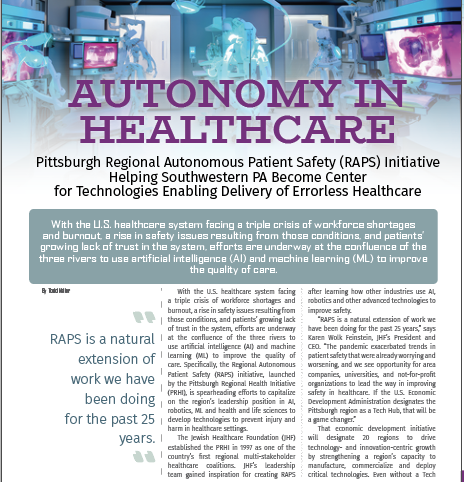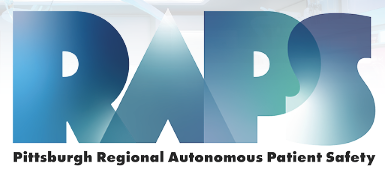Emerging Cluster: Regional Autonomous Patient Safety Initiative
By Todd Miller
 With the U.S. healthcare system facing a triple crisis of workforce shortages and burnout, a rise in safety issues resulting from those conditions, and patients’ growing lack of trust in the system, efforts are underway at the confluence of the three rivers to use artificial intelligence (AI) and machine learning (ML) to improve the quality of care. Specifically, the Regional Autonomous Patient Safety (RAPS) initiative, launched by the Pittsburgh Regional Health Initiative (PRHI), is spearheading efforts to capitalize on the region’s leadership position in AI, robotics, ML and health and life sciences to develop technologies to prevent injury and harm in healthcare settings.
With the U.S. healthcare system facing a triple crisis of workforce shortages and burnout, a rise in safety issues resulting from those conditions, and patients’ growing lack of trust in the system, efforts are underway at the confluence of the three rivers to use artificial intelligence (AI) and machine learning (ML) to improve the quality of care. Specifically, the Regional Autonomous Patient Safety (RAPS) initiative, launched by the Pittsburgh Regional Health Initiative (PRHI), is spearheading efforts to capitalize on the region’s leadership position in AI, robotics, ML and health and life sciences to develop technologies to prevent injury and harm in healthcare settings.
The Jewish Healthcare Foundation (JHF) established the PRHI in 1997 as one of the country’s first regional multi-stakeholder healthcare coalitions. JHF’s leadership team gained inspiration for creating RAPS after learning how other industries use AI, robotics and other advanced technologies to improve safety.
“RAPS is a natural extension of work we have been doing for the past 25 years,” says Karen Wolk Feinstein, JHF’s President and CEO. “The pandemic exacerbated trends in patient safety that were already worrying and worsening, and we see opportunity for area companies, universities, and not-for-profit organizations to lead the way in improving safety in healthcare. If the U.S. Economic Development Administration designates the Pittsburgh region as a Tech Hub, that will be a game changer.”
That economic development initiative will designate 20 regions to drive technology- and innovation-centric growth by strengthening a region’s capacity to manufacture, commercialize and deploy critical technologies. Even without a Tech Hub designation that could come later this year or early next year, giving the region access to additional federal funds, Feinstein believes that Pittsburgh and its environs could become a pacesetter for autonomous patient safety solutions that work behind the scenes to gather and analyze data related to patient care.
As an example of a joint effort in this realm, Feinstein cites the University of Pittsburgh Department of Biomedical Informatics Medication Error Avoidance at Regions Scale (MEARS) study team collaborating with Carnegie Mellon University’s (CMU’s) Initiative for Patient Safety Research (IPSR) team. This collaboration is enabling CMU researchers to develop and test predictive analytic models focused on patient safety and medication error avoidance.
Observes Feinstein, “Collaboration is what we do in Pittsburgh, and we are globally recognized for our rebound in the ‘80s from the shrinkage in traditional industries and our academic–industry partnerships to become world famous in eds, meds and tech. When other industrial cities fell on hard times, people despaired, but in Pittsburgh we rolled up our sleeves and reinvented ourselves by working together.”
Getting Things Started
 To facilitate progress of RAPS-related activities, JHF has provided more than $1.5 million in grant funding over the past couple of years. In September 2021, the organization gave the UPMC Eye and Ear Institute more than $230,000 to support the Digital Twin Eye Project. This pioneering technology initiative brings the frontiers of predictive analytics to healthcare by using big data to provide more effective, personalized treatment for conditions that lead to blindness.
To facilitate progress of RAPS-related activities, JHF has provided more than $1.5 million in grant funding over the past couple of years. In September 2021, the organization gave the UPMC Eye and Ear Institute more than $230,000 to support the Digital Twin Eye Project. This pioneering technology initiative brings the frontiers of predictive analytics to healthcare by using big data to provide more effective, personalized treatment for conditions that lead to blindness.
Last year, JHF supported the AI/MI Healthcare Symposium in Pittsburgh with the University of Pittsburgh’s Center for Military Medicine Research and awarded a $500,000 two-year grant to CMU to establish IPSR.
Earlier this year, JHF provided a $500,000 grant to the University of Pittsburgh School of Medicine’s Department of Biomedical Informatics for its MEARS project, which is also sharing data with CMU’s IPSR team.
Sparking Connections
To help technology and healthcare stakeholders understand and support the RAPS initiative, earlier this year PRHI co-hosted the RAPS Launch Event with the Pittsburgh Technology Council. More than 100 healthcare leaders, researchers, funders, public officials and technology executives gathered at CMU to attend the conference.
Keynote speaker Joe Kiani, President & CEO of Masimo, an Irvine, CA-based global medical technology company and Co-Chair of the Patient Safety Workgroup for the President’s Council of Advisors on Sciences and Technology (PCAST), emphasized the promise of technology in preventing medical errors and the market opportunities for companies that want to serve this fledgling market.
As for ways to improve patient safety, Kiani said, “We don’t have standard operating procedures in almost 99 percent of hospitals today that will prevent human errors from becoming medical errors. These are not surgical errors, but things like medication errors that are killing 200,000 people a year. Because those procedures are not in place today, what we have to do is empower nurses and doctors to implement them.”
Beyond having a strong nucleus of companies that can develop and implement technologies to make the prevention and reporting of medical errors a reality, Kiani believes it is critical for a region to have numerous angel investors who are willing to fund startups with smaller amounts of capital because venture capitalists are generally only willing to invest in companies that have had commercial success.
Over the long term, Feinstein envisions the Pittsburgh Technology Council as a partner for facilitating collaboration among experts like Kiani, companies, and academic and not-for-profit organizations to support policy development and help to promote the Pittsburgh region’s potential as a hub for patient safety solutions.
In Feinstein’s view, “The Biden Administration’s recent announcement of the Tech Hubs program and the Pittsburgh region’s strengths in the patient safety technology arena gives the Council opportunities for helping us to assemble stakeholders to develop this emerging industry.”
Maintaining Momentum
 To complement the activities mentioned, Michael Becich, MD, Ph.D., Associate Vice Chancellor for Informatics in the Health Sciences at the University of Pittsburgh School of Medicine, has been co-leading a regional advisory group composed of representatives from Carnegie Mellon University; University of Pittsburgh School of Pharmacy and Department of Biomedical Informatics; Omnicell, a global company focused on enhancing medication management outcomes with advanced technologies; Promethean LifeSciences, the leader in processing human skin allograft (a tissue graft from a donor of the same species as the recipient but not genetically identical) for use as a sterile medical product; Treatspace, a multi-faceted healthcare platform that enables high-performance referral management, powers online patient engagement, and facilitates clinical collaboration; READE.ai, which focuses on preventing interoperative stroke in patients undergoing neurosurgery; and the Pittsburgh Technology Council, among other partners.
To complement the activities mentioned, Michael Becich, MD, Ph.D., Associate Vice Chancellor for Informatics in the Health Sciences at the University of Pittsburgh School of Medicine, has been co-leading a regional advisory group composed of representatives from Carnegie Mellon University; University of Pittsburgh School of Pharmacy and Department of Biomedical Informatics; Omnicell, a global company focused on enhancing medication management outcomes with advanced technologies; Promethean LifeSciences, the leader in processing human skin allograft (a tissue graft from a donor of the same species as the recipient but not genetically identical) for use as a sterile medical product; Treatspace, a multi-faceted healthcare platform that enables high-performance referral management, powers online patient engagement, and facilitates clinical collaboration; READE.ai, which focuses on preventing interoperative stroke in patients undergoing neurosurgery; and the Pittsburgh Technology Council, among other partners.
“The companies, academic and not-for-profit organizations involved in the regional advisory group and its Patient Safety R&D Salons are helping the Pittsburgh region become a global leader in autonomous patient safety technologies,” says Dr. Becich. “I look forward to expanding the number of organizations involved with our efforts to improve the quality of healthcare and the trust that patients have in the healthcare system.” Interested innovators can join the series of Salons to identify opportunities to collaborate across disciplines and organizations on patient safety R&D.
The RAPS Regional Advisory is also overseeing a Seed Grant Program that will award up to $300,000 to support multidisciplinary R&D teams, start-ups, tech companies or healthcare organizations in the Pittsburgh region that are in the early stages of developing, testing or adopting an autonomous solution to prevent medical errors. The applications are due by October 16.
Some of the other Pittsburgh-area organizations in the safety and technology realms that Feinstein and her team at JHF foresee becoming involved in RAPS include Alcoa, the world-renowned aluminum manufacturing company that pioneered the prioritization of workplace safety under the leadership of longtime CEO Paul O’Neil; Aurora, Inc., an autonomous vehicle company that is building self-driving technology to significantly change how goods and people are transported; Gecko Robotics, a provider of inspection and software modeling technologies; McAbe, Inc., which specializes in workplace fall protection analysis and solutions; MSA Safety, a manufacturer of safety products used in harsh industrial environments; Safe Space Technologies, a provider of autonomous disinfection services that use ultraviolet-C light; and Tele-Tracking Inc., a company that specializes in improving healthcare institutions’ planning to optimize bed capacity and patient flow.
The Enhanced Detection System for Healthcare-Associated Transmission (EDS-HAT) system developed by an interdisciplinary team of researchers from the University of Pittsburgh, CMU and UPMC also factors into the mix by combining AI and genomic (microorganism) surveillance to enable early detection of infectious disease outbreaks and identify transmission routes. The EDS-HAT system would enable an autonomous and rapid response to identify and prevent outbreaks, reduce costs, and improve patient and worker safety. University of Pittsburgh researchers also developed an ML model to predict postoperative adverse events.
Other prospective participants from the education community are Indiana University of Pennsylvania’s Department of Safety Sciences, which can teach clinicians to adapt to healthcare setting hazards management practices developed for industrial environments and Slippery Rock University’s Department of Safety Management that trains safety professionals to optimize workplace ergonomics and prevent and respond to health and physical hazards in a variety of environments.
A Real Need
With one in four hospitalized patients having experienced harm from medical errors before the pandemic and a substantial deterioration in patient safety measures during the pandemic and continuing to the present day, one could argue that R&D in this realm can’t happen fast enough. According to data compiled by RAPS, more than half of nurses surveyed indicated that frequently their units do not have the necessary staff to provide quality care.
Based on years of studying the issue and facilitating actions to solve it, Feinstein believes that “we can’t ask our frontline healthcare workers to do more. Instead, we need to create autonomous, tech-enabled solutions to support and augment their work and use human-factors engineering to build our care teams a better work environment to achieve safe, optimal care. Pittsburgh has the potential to be the place where it gets done.”